by lauenc | Aug 6, 2024
2024 4-H Northwest District Tailgating (Grilling) Contest Results
The 2024 4-H Northwest District Tailgating (Grilling) Contest was a great success and served as a platform to showcase the grilling talents of youth from various counties. This event is part of the broader Florida 4-H Tailgating Contest program, that aims to promote the safe preparation of animal proteins and develop valuable life skills in youth. The 2024 Florida 4-H District and State Contests are sponsored by Publix Super Markets and Sonny’s BBQ.
Program Overview
The Florida 4-H Tailgating Contest encourages participants to grill different types of proteins, including beef, pork, poultry, and shrimp. Youth compete at county and district levels, with top performers advancing to the state competition. The Contest also requires participants to create a tabletop display to show off their recipe and creativity. Participants may use a laptop/iPad/poster & easel to complement their tabletop display to describe their recipe. The overall program emphasizes the development of grilling skills, highlights food and fire safety, and promotes healthy lifestyle choices.
2024 CONTEST RESULTS
Beef Category

- 1st Place: Cate B. (Okaloosa)
- 2nd Place: Jade L. (Liberty)
- 3rd Place: Sydney G. (Escambia)
- 4th Place: Charlie B. (Gadsden)
Pork Category

- 1st Place: Taylor A. (Escambia)
- 2nd Place: Josh W. (Washington)
- 3rd Place: Brogan B. (Holmes)
- 4th Place: Malec C. (Liberty)
Chicken Category
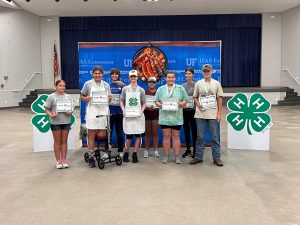
- 1st Place: Tucker P. (Escambia)
- 2nd Place: Braden P. (Escambia)
- 3rd Place: Kylie T. (Bay)
- 4th Place: Emmit A. (Holmes)
Shrimp Category
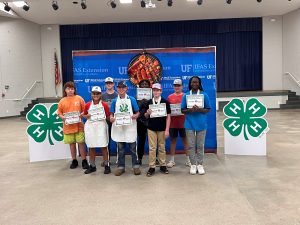
- 1st Place: Chipper M. (Holmes)
- 2nd Place: Jeb W. (Gadsden)
- 3rd Place: Hunter S. (Escambia)
- 4th Place: Cheyanne H. (Gadsden)
Prizes
Winners in each category were awarded as follows:
- 1st Place: $400
- 2nd Place: $250
- 3rd Place: $100
- 4th Place: $50
State Competition
The top two winners from each category will advance to the Florida 4-H Tailgating State Contest on October 5, 2024, at the Animal Sciences Beef Teaching Unit in Gainesville, FL. Participants will have the opportunity to compete for further recognition and scholarships.
State Contest
For each protein category:
- 1st Place: $1,500
- 2nd Place: $1,000
The Florida 4-H Tailgating Contest not only provides a competitive platform but also equips youth with essential life skills, fostering a healthy lifestyle and decision-making abilities (Florida 4-H) (UF IFAS Extension). For more information about the District Contests and the State Contest, contact your local 4-H Agent and visit Tailgate Contest – Florida 4-H – University of Florida, Institute of Food and Agricultural Sciences – UF/IFAS (ufl.edu).
by Valerie Mendez Stansly | Mar 28, 2024
As we continue with part two of our series ‘Planning a Safe and Engaging Paddling Adventure for Youth,’ our goal is to highlight the key elements that make these excursions both memorable and educational. You will be introduced to the essentials of group dynamics, communication strategies, and incorporating educational components to your trip. Whether you’re planning a day trip or a multi-day camp, the information in this blog will help you navigate the challenges and delights of introducing young paddlers to the wonders of the great outdoors.
Paddling is a Group Activity
A successful paddling trip depends greatly on strong group dynamics and clear communication. Prior to getting on the water, it’s essential to conduct a thorough on-land training session that covers the basics of paddling, maintaining balance, and methods for recovering from a capsize. Turning these drills into interactive and enjoyable activities can greatly alleviate any nervousness and boost the confidence of your youth participants. For those organizing multi-day camps, scheduling this training a day in advance can be particularly beneficial—the more familiar youth become with these practices, the better.
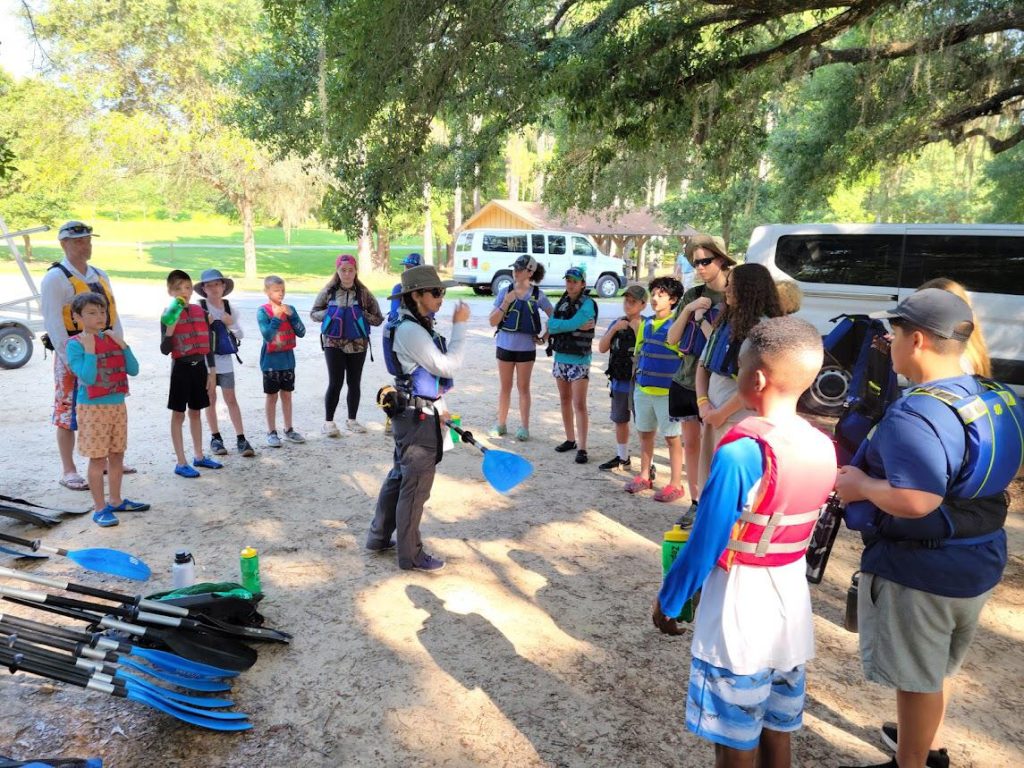
A successful paddling trip fosters solid group dynamics, clear communication, and teachers essential on-land training that covers paddling fundamentals, balance maintenance, and capsize recovery techniques.
Before setting out, it’s important that designated adult volunteers take on the specific roles, such as the lead and sweep, to maintain order and ensure the group’s safety throughout the adventure. The lead is responsible for navigating the route, monitoring for hazards, being mindful of other waterway users, and setting a pace that accommodates the entire group. The sweep boat, positioned at the end of the group, ensures that no one falls behind. This position requires experience with rescue situations, the capability to offer aid during capsizes or emergencies, and typically includes the responsibility of carrying a first aid kit along with having certifications in first aid, and CPR.
Effective and clear communication is essential when on the water. All paddlers should stay within earshot of each other to facilitate this. However, if distance makes verbal communication challenging, hand, paddle, and whistle signals become crucial tools for conveying messages. For instance, holding a paddle horizontally above your head signals others to stop paddling. Raising your arms vertically signifies an all-clear or prompts others to proceed. Waving your paddle overhead indicates a need for assistance in emergencies. To direct paddlers, use your paddle to point in the intended direction of travel, avoiding using it to point out hazards.
Whistle signals also play a key role in communication:
- One whistle blast calls for attention, urging the group to stop and wait for further instructions.
- Two blasts instruct paddlers to stop and remain in their current location.
- Three blasts signal an emergency, indicating that help is needed.
By creating clear communication among experienced adults, the trip not only becomes safer but also serves as an opportunity to demonstrate responsibility and leadership to youth on the trip. This structure provides a secure environment where youth can focus on refining their paddling skills and fully engage in the educational aspects of the activity. Modeling teamwork within the adults fosters a sense of unity throughout the team, enabling everyone to navigate challenges more effectively.
In case of a Capsize
When someone capsizes, it’s essential to remember your rescue priorities. The safety of people is always the most important. First, make sure everyone is safe. Then, collect boats and paddles. After securing the larger items, you can retrieve smaller gear like water bottles and dry bags.
If you’re the rescuer, it’s crucial to stay calm and control your boat to avoid becoming a casualty yourself. Ask for help if needed, giving clear instructions to the victim or other group members. If you’re witnessing a capsize, sometimes the best action is to stay clear unless the rescuer calls for assistance. If asked to help, follow their instructions while keeping yourself and your boat under control.
As a potential rescuer, remember the sequence talk – reach – throw – paddle – go.
- Talk: Start by getting the attention of the capsized paddler using your voice, whistle, or another sound device. Often, simply talking them through staying calm and performing a self-rescue is enough.
- Reach: If more than verbal guidance is needed, use the reach method. Extend your paddle or arm to help. Guide them to the front of your kayak for safety, avoiding having them hold onto the side, which could destabilize your kayak.
- Throw: When the capsized paddler is too far for a reach, throw them a rope or a life float they can grab onto.
- Paddle: If neither talking, reaching, nor throwing works, paddle close enough to them so they can be safely pulled to safety using the reach or throw method.
- Go: As a last resort, you may need to get into the water to assist, which involves significant risk. Ensure bystanders are calling for help while you swim to the capsized paddler’s aid.
This approach ensures everyone knows their role in a capsize situation, prioritizing safety and effective rescue techniques.
Outdoor Education and Stewardship
Enhance your paddling journey by turning it into a comprehensive educational experience, focusing on the local ecosystem and conservation initiatives. By immersing participants in the surrounding natural environment, you deepen their connection and commitment to environmental stewardship.
Teaching and practicing Leave No Trace principles is key to fostering respect for our natural surroundings. Paddling leaders play a crucial role in emphasizing the importance of minimizing our environmental impact, showing consideration for wildlife, and preserving the natural beauty of our waterways. Instilling these values in young paddlers helps them understand the critical role they play in conservation efforts and encourages them to engage in responsible outdoor behaviors well into adulthood.
Reflection
Incorporating a debrief, or post-trip reflection session, into your paddling adventure is an excellent way to incorporate principles of experiential learning, which values learning through action and reflection. After your trip, taking time for a debrief enables participants to express their thoughts on the activity, confront challenges encountered, and share new insights. Purposeful reflection is essential to the experiential learning process, helping learners to internalize their experiences and apply their insights in future contexts.
Debriefing among adults is also important. Scenarios encountered during the trip may highlight potential opportunities where additional training from certified instructors to improve paddling skills and safety knowledge is needed.
Conclusion
Embarking on a paddling adventure with youth offers more than just a day on the water; it’s an opportunity to foster teamwork, respect for nature, and a commitment to environmental stewardship through experiential learning. By incorporating safety, education, and reflection, we not only ensure a memorable and enriching experience but also instill important values and skills that youth will carry with them long after the trip ends.
Resources:
Want to learn more? Check out Paddle TV on YouTube which has made great videos in partnership with the American Canoe Association (ACA) by following the link: https://americancanoe.org/education/youth-paddling-development/educational-videos/
Consider using the Paddle Safe Paddle Smart (PS2) curriculum that has been created by ACA when implementing a paddling component during day camps or workshops.
Paddling Trip Checklist for Leaders
This checklist serves as a foundational tool for leaders to ensure that every aspect of the paddling trip is accounted for, from safety to environmental education. By following this guide and utilizing the checklist, leaders can provide a safe, enjoyable, and enriching paddling experience that youth participants will remember for years to come.
by Valerie Mendez Stansly | Mar 21, 2024
Setting off on a paddling adventure with youth, whether it involves canoeing, kayaking, or stand-up paddleboarding (SUP), offers a wonderful opportunity for them to get active, connect with the outdoors, and learn the value of teamwork. These activities can leave a lasting impression on the young people involved, fostering feelings of accomplishment, resilience, and fellowship. However, the responsibility on the adults leading these trips is significant. Ensuring a safe, educational, and enjoyable experience requires meticulous planning, a focus on safety, and a commitment to engaging each participant. Through this blog series, you will be provided with the insights and tools necessary to organize a successful paddling event for youth.
Securing Kayaks
Safety is the foundation of any successful paddling adventure, especially when involving young people. A critical, yet often overlooked, aspect of this safety is the secure transportation of your kayaks. Begin by firmly attaching your kayaks to your trailer using suitable straps. Before hitting the road, double-check that the straps are tightly fastened, the ends are securely tied off, and the kayak doesn’t move when you gently rock it.
When loading a kayak, always position the straps in advance. It’s a team effort to safely lift the kayak by its bow (front) and stern (back) handles—remembering to bend at the knees to protect your back. Once the kayak is evenly placed on the trailer’s crossbars, secure it properly by using the appropriate ties. Although ratcheting straps are commonly used, they can potentially damage your kayak due to excessive pressure. As an alternative, the use of buckle bumper straps offers a safe and user-friendly solution for both novices and experienced paddlers alike. Ensuring your kayaks are safely secured not only protects your equipment but also ensures the safety of everyone on the road.
Planning is Essential – Crafting a Float Plan
The backbone of a smooth paddling adventure is a detailed float plan. This document should outline your route, expected weather conditions, participant list with emergency contacts, and a timeline of the trip. Utilizing resources such as the Coast Guard Float Plan Central website ensures you don’t miss any critical planning steps. Your float plan should include not only the basics but also specific details such as the equipment each person will bring, health forms, expected departure and return times, access points, and the driving route. It’s also vital to assess and document the day’s weather, tides, water flow, and temperature, alongside local regulations, necessary permits, and the nearest emergency services and outfitters.
In addition to creating a comprehensive float plan, it’s essential to pack necessary items like water, snacks, sunscreen, and first-aid supplies, while encouraging lightweight packing to minimize the physical load on paddlers. Ensure that agents and other adults in charge involved are well-informed about the float plan, current and forecasted weather conditions, and the personal skills and comfort levels within the group.
Remember, the float plan is not just a list; it’s a snapshot of your group’s capabilities, equipment, and safety resources. Items not directly related to trip planning and participant safety should be recorded separately. Always leave the float plan with someone on shore who is familiar with the trip details, participants, and local area. This person’s responsibility is to alert local authorities should the group not return as scheduled. Typically, float plans are best entrusted to an agent and/or county extension director.
When you are out on the water, pay close attention to changing weather conditions. If the weather gets challenging, ensure your group stays together and maintains steady communication. In the case of unexpected thunder, lightning, heavy rain, or strong wind, find a protected area on land for the group to escape the elements. If the group gets off the water, be sure that boats or boards are far away from the water’s edge. Make sure to take all paddles and any food, water, and personal gear are with youth.
Choosing the Right Gear
Personal gear and preparedness are crucial for the success of your paddling trip. When choosing a paddling outfit, prioritize versatility, durability, and protection against cold, and wet conditions. Here are some key guidelines:
- Personal Flotation Device (PFD): Always wear a PFD while on the water. Ensure it fits snugly without riding up over your face or head. If adjustments are needed, do so safely onshore.
- Temperature Considerations: Youth and adults should dress for potential immersion. Hypothermia, a dangerous drop in body temperature, can occur in water temperatures as “warm” as 70 degrees Fahrenheit, according to U.S. Coast Guard. Conversely, hyperthermia results from overheating, often due to hot, humid conditions. Dressing in layers will help adjust for body temperature changes during the trip.
- Sun Protection: Applying sunscreen is critical for preventing sunburn and overheating, even on cloudy days. Due to the reflective nature of water, apply sunscreen often. Mineral sunscreen, with zinc oxide or titanium dioxide, forms a barrier against UV rays with a reduce risk of irritation or allergic reaction and is favored by many paddlers.
- Avoid cotton and restrictive clothing: Steer clear of cotton clothing such as jeans and hoodies, which retain water when wet. Instead choose garments made from quick-drying, moisture-wicking synthetics, or wool, which provide insulation even when wet. Fortunately, outfitting yourself appropriately doesn’t have to break the bank—many of these items can be readily found at affordable prices in secondhand stores like Goodwill.
By following safety guidelines and preparing with the right gear, paddlers can enjoy a safe and comfortable experience on the water, ready to face varying temperatures and conditions with confidence. In the next blog, we will discuss group management and safety considerations to take while on the water.
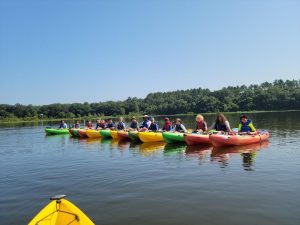
Introducing youth to the joys of paddling can create unforgettable memories that last a lifetime. At the same time, it’s crucial that we, as adults, prioritize their safety above all.
Resources:
Want to learn more? Check out Paddle TV on YouTube which has made great videos in partnership with the American Canoe Association (ACA) by following this link: https://americancanoe.org/education/youth-paddling-development/educational-videos/
Consider using the Paddle Safe Paddle Smart (PS2) curriculum that has been created by ACA when implementing a paddling component during day camps or workshops.
by Marcus Boston Jr. | Mar 8, 2024
The form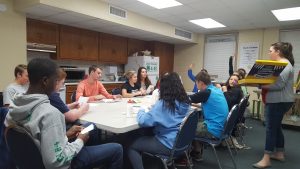 ulation of an effective camp counselor training program is crucial for ensuring a positive and enriching experience for both campers and counselors alike. The primary objective of any summer camp should be to recruit, train, and support competent counselors who can contribute to the overall enjoyment and success of the camp. Counselors play a pivotal role in shaping the camp experience, and their training is essential in achieving this goal.
ulation of an effective camp counselor training program is crucial for ensuring a positive and enriching experience for both campers and counselors alike. The primary objective of any summer camp should be to recruit, train, and support competent counselors who can contribute to the overall enjoyment and success of the camp. Counselors play a pivotal role in shaping the camp experience, and their training is essential in achieving this goal.
When designing a counselor training program, it is imperative to cater to various learning styles and preferences among participants. This includes accommodating visual, auditory, and kinesthetic learners by incorporating a diverse range of methods and activities into the training sessions.
Five key components of a successful 4-H camp counselor training program:
- Community Service: Initiating activities that allow counselors to engage in community service not only fosters a sense of social responsibility but also serves as an effective icebreaker, facilitating bonding among participants. (examples: gleaning citrus trees, sorting at food banks, assisting with clothing drives, etc.)
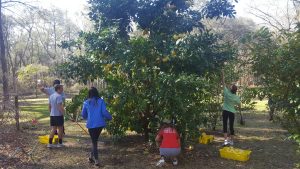
- Ice Breakers: Commencing each training session with ice breakers and team-building activities helps to create a cohesive and supportive atmosphere among counselors, setting a positive tone for the camp.
- Multimedia Presentations: Utilizing multimedia presentations comprising visuals and quotes can effectively highlight important concepts and enhance the learning experience for counselors.
- Hands-On Activities: Incorporating hands-on activities into the training program ensures active engagement and caters to the diverse learning styles of participants.
- Social Time: Allowing for social interactions and downtime during the training schedule enables counselors to build relationships and establish a sense of camaraderie, which is essential for effective teamwork during the camp session.
Additionally, facilitating structured discussions and reflection sessions after completing activities enables counselors to share their experiences, analyze their learning, relate it to real-life situations, and apply newfound knowledge to future scenarios.
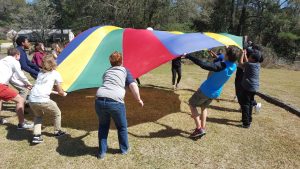 Furthermore, individuals interested in assuming leadership roles at the camp should undergo a selection process involving applications and interviews to ensure suitability for the position. This ensures that counselors align with the principles of Positive Youth Development, which is integral to the camp’s mission.
Furthermore, individuals interested in assuming leadership roles at the camp should undergo a selection process involving applications and interviews to ensure suitability for the position. This ensures that counselors align with the principles of Positive Youth Development, which is integral to the camp’s mission.
Source: Kentucky 4-H Counselor Training Guide

by lauenc | Jul 6, 2023
In today’s fast-paced digital age, it’s essential for young minds to engage in activities that foster creativity, practical skills, and personal growth. Summer day camps with 4-H provide an excellent opportunity for youth to explore their interests and develop new talents while having “sew” much fun! Thanks to the Florida 4-H Foundation’s Clothing, Textiles, and Fashion Mini Grant, supported by JOANN Fabric and Craft, Holmes County 4-H Sewing Summer Day Camp was made possible. In this post, you will discover the enriching experiences and valuable lessons that 4-H members gained while immersing themselves in the world of sewing, textiles, and fashion.
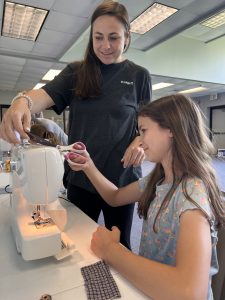
Nurturing Creativity:
At the heart of the sewing summer day camp lies the spirit of creativity. Through hands-on projects and guided instruction, participants discovered the joy of transforming fabrics into unique and stylish creations. From selecting patterns and colors to sewing intricate details, campers were encouraged to let their imagination soar. The camp provided a safe and supportive environment for young minds to explore their creativity, leading to the development of innovative designs and personal style.

Building Practical Skills:
Sewing is a practical skill that cultivates patience, precision, and problem-solving abilities. Throughout the camp, youth were introduced to the fundamentals of sewing, including understanding different fabrics, operating sewing machines, and mastering essential stitching techniques. Under the guidance of experienced instructors, participants progressively honed their skills, learning how to read patterns, measure and cut fabric, and assemble garments with finesse. These newfound skills empowered the youth to embark on independent sewing projects beyond the camp.
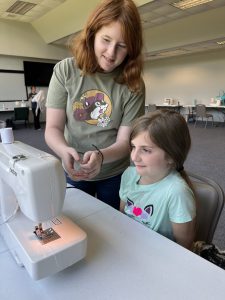
Fostering Teamwork and Collaboration:
The sewing summer day camp fostered an environment of teamwork and collaboration, where participants worked together to complete various sewing projects. Whether assisting each other with challenging stitching or providing creative input during design discussions, campers learned the value of cooperation and the power of collective effort. Through these interactions, they discovered that the world of sewing extends beyond individual endeavors and that sharing knowledge and skills can enhance everyone’s experience.
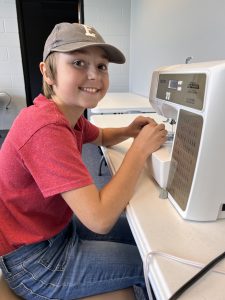
Cultivating Attention to Detail:
Precision and attention to detail are crucial aspects of sewing. Throughout the camp, participants were encouraged to carefully measure, cut, and sew fabrics to achieve flawless results. They learned the importance of meticulous planning, double-checking measurements, and maintaining focus throughout the sewing process. Cultivating this attention to detail not only improved their sewing outcomes but also instilled in them a valuable life skill applicable in various contexts.
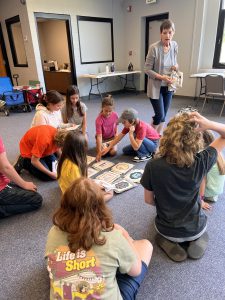
Navigating Fashion Trends and Sustainability:
Through engaging discussions and interactive sessions, campers explored the concepts of fashion, upcycling, and sustainable fabric choices. They gained an understanding of the environmental impact of fast fashion and discovered how they can make a positive difference by embracing sustainable practices in their own sewing projects and daily lives.
The Holmes County 4-H Sewing Summer Day Camp, made possible by the Florida 4-H Foundation’s Clothing, Textiles, and Fashion Mini Grant supported by JOANN Fabric and Craft, offered an incredible opportunity for youth to explore the world of sewing, textiles, and fashion. Participants not only developed practical sewing skills, but also nurtured their creativity, fostered teamwork, honed attention to detail, and gained insights into sustainable fashion practices. Through this enriching experience, 4-H youth were empowered to express their individuality, explore their passions, and embark on a lifelong journey of creativity and self-discovery.
For more information about upcoming youth programming related to sewing, textiles, and fashion with Holmes County 4-H, visit the UF IFAS Extension Holmes County 4-H Facebook page or contact the Holmes County 4-H Agent at 850-547-1108.
To learn more about how JOANN can support 4-H programming in your county, visit 4-H | JOANN Discount Program.
#JOANNLOVES4H
@Florida4H

by lauenc | Jun 30, 2023
As summer approaches and the days grow longer, it’s the perfect time to engage 4-H youth in outdoor activities that blend fun, learning, and teamwork. One exciting way to accomplish this is to organize a tailgating (grilling) camp and grilling exhibition in preparation for your District 4-H Tailgating Contest. 4-H Agents and volunteers have a unique opportunity to guide young participants in the art of grilling while instilling valuable life skills and fostering a sense of camaraderie. In this blog post, we will explore the benefits of incorporating a tailgating (grilling) competition into your summer programming.

Building Life Skills: Grilling is not just about cooking delicious food; it also teaches various life skills that are essential for personal and professional growth. By incorporating a tailgating competition into your summer programming, you can help young participants develop skills such as teamwork, leadership, communication, time management, and problem-solving. These skills are valuable in all aspects of life and will benefit them in the long run.
Fostering Creativity: Tailgating competitions offer a platform for youth to unleash their creativity. Encourage participants to come up with unique recipes, experiment with flavors, and showcase their grilling techniques. This will not only boost their confidence, but also stimulate their culinary imagination. Remember to emphasize the importance of food safety and hygiene throughout the process.
Encouraging Healthy Eating: While contest participants are limited to pork, beef, chicken, and shrimp during the actual competitions, you can use the tailgating competition as an opportunity to promote healthy eating habits among youth. Encourage participants to incorporate nutritious ingredients such as lean proteins, fresh vegetables, and whole grains into their recipes. Teach them about the benefits of balanced meals and provide resources on how to make healthier choices when grilling.
Creating a Sense of Community: Organizing a tailgating competition brings people together and creates a sense of community among participants. Encourage teams or individuals to share their grilling experiences, techniques, and recipes with one another. This fosters a supportive environment where everyone can learn from each other and build lasting connections.
In June 2023, Holmes County 4-H added another element to their annual 4-H Tailgating Summer Day Camp by including a public grilling exhibition and competition. The event was held in conjunction with Peppertown Market, a monthly community-wide street market in downtown Bonifay. Holmes County 4-H youth had an opportunity to hear constructive criticism and words of encouragement from judges and volunteers as they competed for a spot at the Northwest District Tailgating Contest. The grills and youth were strategically placed to create a high impact opportunity to boost awareness of Holmes County 4-H. Event attendees had the opportunity to speak with 4-H volunteers and the 4-H Agent to obtain resources and learn more about Holmes County 4-H. Volunteers also utilized the event as a fundraising opportunity by selling peach cobbler made in a Dutch oven on location near our 4-H youth that were grilling. Proceeds were used to offset the costs associated with the Tailgating Camp and Grilling Exhibition.
Incorporating a tailgating camp and grilling exhibition into your summer programming offers numerous benefits for youth development. By teaching grilling skills, fostering creativity, promoting healthy eating, and creating a sense of community, you can inspire young participants to embrace outdoor cooking as a lifelong hobby. Remember to prioritize fire safety, provide access to reliable resources, and encourage participants to explore various grilling techniques. With your guidance, they will light the fire for grilling success and create memorable experiences that extend beyond the summer months.
The 2023 Florida 4-H Northwest District Tailgating Contest will be held in Chipley, Florida on July 22, 2023. Winners from the each of the District contests will be invited to compete at the State Contest on Saturday, September 23, 2023 in Gainesville, Florida.
Contact your local 4-H Agent and visit Tailgate Contest – Florida 4-H – University of Florida, Institute of Food and Agricultural Sciences – UF/IFAS (ufl.edu) to explore a wide variety of informative resources that can help “spark” a passion for food science and fire safety.
- Region 1 | Northwest District Contest
| Key Questions |
Information |
| When |
Saturday, July 22, 2023 |
| Where |
Washington County Agricultural Center, 1424 Jackson Ave, Chipley, FL 32428 Counties |
| Registration |
May 5 to July 15, 2023 |
| Grill Setup |
Grill setup will be from 9:15 a.m. CDT to 10 a.m. CDT with grills starting at 10:15 a.m. CDT. |
| Counties |
Bay, Calhoun, Escambia, Franklin, Gadsden, Gulf, Holmes, Jackson, Jefferson, Leon, Liberty, Okaloosa, Santa Rosa, Wakulla, Walton, Washington |
| Coordinators |
Mark Mauldin, mdm83@ufl.edu, & Brian Estevez, bestevez@ufl.edu |

















